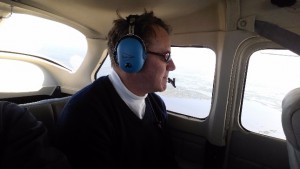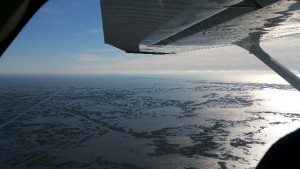ASP in Louisiana: Climate Change Threatens Security of Louisiana
Podcast: Play in new window | Download
Subscribe: Apple Podcasts | RSS
On Wednesday, Thursday, and Friday – March 25th through 27th – representatives of the American Security Project visited Baton Rouge and New Orleans, Louisiana for a series of meetings, public events, and briefings on how climate change is affecting security, how institutions in the region are planning for it, and how that will impact the careers of military and civilians working on national security in the future.
Attending were Lieutenant General Arlen Jameson, USAF (Ret.) and Brigadier General Stephen A. Cheney, USMC (Ret.). Cheney is the CEO of the American Security Project, and a 30 year veteran of the Marine Corps. His career includes a wide variety of command and staff positions, including Inspector General of the Marine Corp and Commanding General at Parris Island. Jameson served in the Air Force for more than three decades, most of them in strategic missile forces; since retirement, the lifelong Texan has been involved in military and commercial space businesses and has served as Executive Director of the Texas Telecommunications Infrastructure Fund. Porter Brockway, ASP’s events manager, rounded out the delegation.
Sit-Down Interview with The Advocate
Hours after ASP’s delegation landed in Baton Rouge, Generals Cheney and Jameson sat down with reporter Amy Wold of The Advocate. The generals discussed with Ms. Wold the national security implications of climate change as well as some of the impacts to the Louisiana area. Gen. Cheney noted that many people do not see climate change as a national security issue but that hopefully this stop on the national tour will bring about more visibility to the issue.
Read the full article from The Advocate
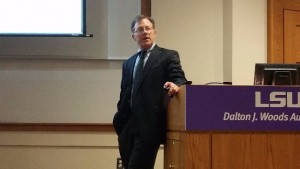 The first public discussion on the tour was at Louisiana State University, where Generals Cheney and Jameson spoke to a crowd of faculty, students, and local residents. Their 6:00 PM speech started with General Cheney laying out the facts about climate change in a presentation and drawing upon personal stories to relate this to the audience. Then General Jameson discussed how climate change is going to change the operating environment for the military, and continued to discuss some of the threats stated by Cheney.Together, the two generals drew upon their years in intelligence and planning to discuss how the military views all threats: they identify a risk, then take measures to reduce that risk – unlike the politically charged process in which climate and energy policy is made today.The event was organized by Dr. Christopher D’Elia, Dean of the School of the Coast and Environment for Louisiana State University.Audio of the Louisiana State University Presentation.
The first public discussion on the tour was at Louisiana State University, where Generals Cheney and Jameson spoke to a crowd of faculty, students, and local residents. Their 6:00 PM speech started with General Cheney laying out the facts about climate change in a presentation and drawing upon personal stories to relate this to the audience. Then General Jameson discussed how climate change is going to change the operating environment for the military, and continued to discuss some of the threats stated by Cheney.Together, the two generals drew upon their years in intelligence and planning to discuss how the military views all threats: they identify a risk, then take measures to reduce that risk – unlike the politically charged process in which climate and energy policy is made today.The event was organized by Dr. Christopher D’Elia, Dean of the School of the Coast and Environment for Louisiana State University.Audio of the Louisiana State University Presentation.
Tulane University
The next stop on the tour brought Generals Cheney and Jameson to the campus of Tulane University in New Orleans, a small private University in the heart of the city.
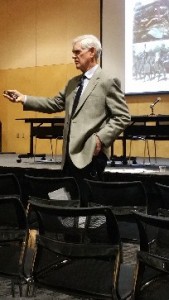 At this event, ASP spoke to a group of 50 students and faculty during a midday presentation. Similar to LSU, General Cheney and Jameson presented the case that climate change is not only real, but a national security priority that the U.S. military is confronting. With the dangers of climate change being an ever present threat in New Orleans, it was not difficult for the audience to relate to what Gen. Cheney and Gen. Jameson were saying to them.
At this event, ASP spoke to a group of 50 students and faculty during a midday presentation. Similar to LSU, General Cheney and Jameson presented the case that climate change is not only real, but a national security priority that the U.S. military is confronting. With the dangers of climate change being an ever present threat in New Orleans, it was not difficult for the audience to relate to what Gen. Cheney and Gen. Jameson were saying to them.
The generals touched on the topic of extreme weather, such as hurricanes, and how devastation could become more of a common occurrence as sea temperatures rise. This could bring more Katrina-like storms to a city that is already dealing with a loss of wetlands and rising sea levels.
The event was organized by Dr. Katherine Jack, Director of Environmental Studies for Tulane University.
Audio of the Tulane University Presentation.
Dillard University
Our last public presentation on our tour through Louisiana was at Dillard University in New Orleans. This historically black college (HBCU) was proud to incorporate our generals into the 3rd Annual Student Climate Change Conference with participation from 17 universities.
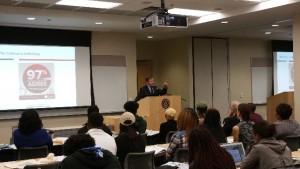 General Cheney opened up remarks and began speaking about the military operations and national security planners ever important need to incorporate climate change into defense models. The crowd of over 100 student, faculty, and a live-stream audience to all HBCU universities listened intently as Cheney discussed the impacts that this will have on all our lives in the years to come. Additionally, Gen. Cheney brought to light the importance of student engagement, such as that from the conference, and the impact these future leaders will have in shaping the nation’s direction on energy and climate.
General Cheney opened up remarks and began speaking about the military operations and national security planners ever important need to incorporate climate change into defense models. The crowd of over 100 student, faculty, and a live-stream audience to all HBCU universities listened intently as Cheney discussed the impacts that this will have on all our lives in the years to come. Additionally, Gen. Cheney brought to light the importance of student engagement, such as that from the conference, and the impact these future leaders will have in shaping the nation’s direction on energy and climate.
Aerial Tour of the Wetlands
The last stop on our tour through Louisiana was to take a trip over the wetlands via aircraft.
With the flight provided by SouthWings and the guide from the Gulf Restoration Network, Gen. Cheney was given a detailed overview of the health of the Mississippi delta and the impacts drilling, rising sea levels, and storms have had on this vital area of the state.
During the aerial tour of the wetlands, ASP learned that the loss of land is equivalent to a football field every 45 minutes. As the loss of land continues to grow, the result means higher and higher storm surges from severe weather. For every three to four miles of wetlands lost equates to an additional foot from storm surges.
As drilling continues in the delta and sea levels continue to rise, the situation for Louisiana and the New Orleans region is precarious. The state will face many challenges in order to restore some of the wetlands – a vital part of the area’s ecosystem and defense against storms. As climate change continues it is difficult to say what will happen to the delta if action is not taken.

